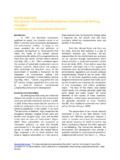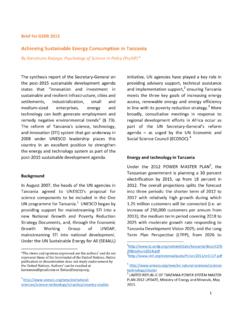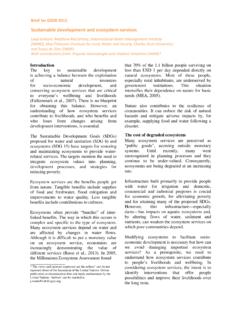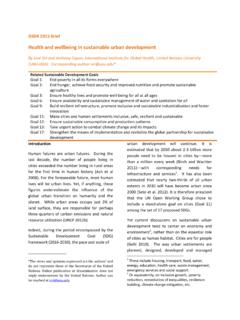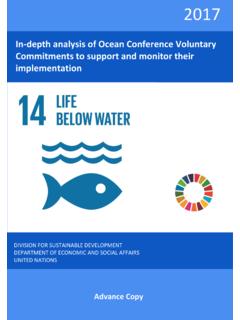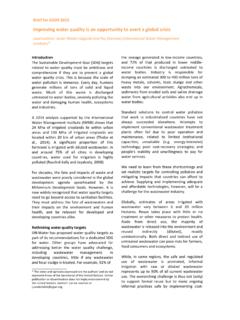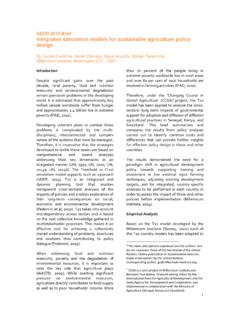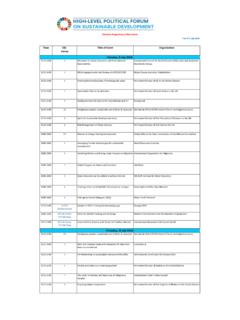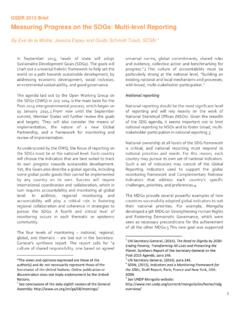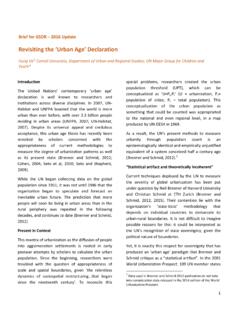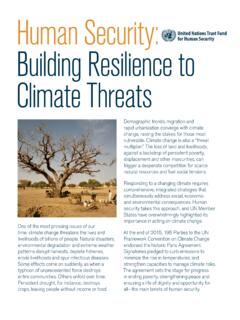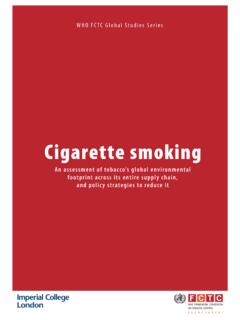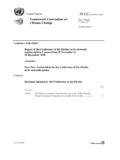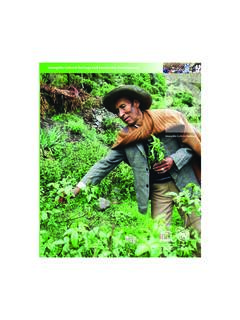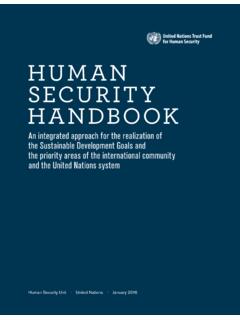Transcription of The Bahamas - United Nations
1 The Bahamas Voluntary National Review on the Sustainable Development Goals to the High Level Political Forum of the United Nations Economic and Social Council Government of The Bahamas July 2018 1 Picture 1: Artwork by students of the Salina Point and the Centreville Primary Schools on the topic My Vision for The Bahamas in 2040 2 Table of Contents Opening Statement .. 6 Highlights .. 8 Integration of the SDGs into the National Development Plan .. 8 Institutional Arrangements .. 9 Leaving No-One -Behind .. 9 Areas where support is needed for finance, capacity-building, technology, partnerships, etc. 10 Introduction .. 11 Methodology and process for preparation of the review.. 13 Policy and Enabling Environment .. 14 Creating Ownership of the Sustainable Development Goals: National Level Discussions.
2 15 Creating Ownership of the Sustainable Development Goals: Community Discussions Public, Private Sector and Civil Society Discussions .. 17 Incorporation of the Sustainable Development Goals in National Framework .. 19 Alignment of the NDP with the SDGs .. 23 Integration of the 3 Dimensions of Sustainable Development .. 35 Leaving No One Behind .. 36 National Institutional Mechanisms for the Ongoing Implementation of the SDGs .. 37 National Mechanisms for Monitoring Progress and Data Reporting .. 38 Data Availability for Monitoring the SDGs .. 39 Challenges Faced Monitoring the SDGs .. 40 Progress on Goals and Targets .. 41 SDG1: Ending Poverty in all its Forms .. 41 Key Interventions for Implementing SDG1 .. 43 Challenges Faced Implementing SDG1 Programmes.
3 47 3 SDG2: End Hunger, Achieve Food Security & Improved Nutrition & Promote Sustainable Agriculture .. 48 Key Interventions for Implementing SDG2 .. 49 Challenges Faced Implementing SDG2 Programmes .. 51 SDG3: Ensure Healthy Lives & Promote Well-Being for all at all Ages .. 52 Key Interventions for Implementing SDG3 .. 54 Challenges Faced Implementing SDG3 Programmes .. 57 SDG4: Ensure Inclusive & Quality Education for all & Promote Lifelong Learning .. 57 Key Interventions for Implementing SDG4 .. 60 Challenges Faced Implementing SDG4 Programmes .. 63 SDG5: Achieve Gender Equality & Empower all Women & Girls .. 64 Key Interventions for Implementing SDG5 .. 65 Challenges Faced Implementing SDG5 Programmes .. 69 SDG6: Ensure Availability & Sustainable Management of Water & Sanitation for All.
4 69 Key Interventions for Implementing SDG6 .. 70 Challenges Faced Implementing SDG6 Programmes .. 71 SDG7: Ensure Access to Affordable, Reliable, Sustainable & Modern Energy for All.. 72 Key Interventions for Implementing SDG7 .. 73 Challenges Faced Implementing SDG7 Programmes .. 76 SDG8: Promote Sustained, Inclusive & Sustainable Economic Growth, Full & Productive Employment & Decent Work for All .. 76 Key Interventions for Implementing SDG8 .. 77 Challenges Faced Implementing SDG8 Programmes .. 85 SDG9: Build Resilient Infrastructure, Promote Inclusive & Sustainable Industrialisation & Foster 86 Key Interventions for Implementing SDG9 .. 88 4 Challenges Faced Implementing SDG9 Programmes .. 92 SDG10: Reduce Inequality within & among Countries .. 92 Key Interventions for Implementing SDG10.
5 93 Challenges Faced Implementing SDG10 Programmes .. 94 SDG11: Make Cities Inclusive, Safe, Resilient & Sustainable .. 94 Key Interventions for Implementing SDG11 .. 97 Challenges Faced Implementing SDG11 Programmes .. 102 SDG12: Ensure Sustainable Consumption & Production Patterns .. 103 Key Interventions for Implementing SDG12 .. 103 Challenges Faced Implementing SDG12 Programmes .. 104 SDG13: Take Urgent Action to Combat Climate Change & its Impact .. 104 Key Interventions for Implementing SDG13 .. 106 Challenges Faced Implementing SDG13 Programmes .. 108 SDG14: Conserve & Sustainably Use the Oceans, Seas & Marine 109 Key Interventions for Implementing SDG14 .. 111 Challenges Faced Implementing SDG14 Programmes .. 115 SDG15: Protect, Restore & Promote Sustainable Use of Terrestrial Ecosystems, Sustainably Manage Forests, Combat Desertification & Halt the Reverse Land Degradation & Halt Biodiversity 117 Key Interventions for Implementing SDG15.
6 118 Challenges Faced Implementing SDG15 Programmes .. 122 SDG16: Promote Just, Peaceful & Inclusive Societies .. 122 Key Interventions for Implementing SDG16 .. 123 Challenges Faced Implementing SDG16 Programmes .. 129 SDG17: Strengthen the Means of Implementation & Revitalize the Global Partnership for Sustainable Development .. 130 5 Key Interventions for Implementing SDG17 .. 131 Challenges Faced Implementing SDG17 Programmes .. 134 Means of Implementation .. 135 The Current Situation .. 135 Mechanisms for Mobilizing Domestic Resources .. 137 Mechanism to Address Internal Resource Gaps for Implementing the SDGs .. 138 Global Integration .. 138 Development Assistance .. 138 Next Steps .. 139 Conclusion .. 140 142 REFERENCES .. 152 6 Opening Statement The Bahamas , a small island developing state, is fully committed to achieving the 2030 Agenda for Sustainable Development.
7 These global goals are consistent with and are fully integrated into the country s National Development framework. In 2014, The Bahamas began the process of developing a 25-year National Development Plan: Vision 2040. Recognizing the synergies between the National Development Plan and the Sustainable Development Goals, the Government of The Bahamas ensured that the 2030 Agenda has been localised into its national development planning process thereby providing a roadmap for the implementation of the SDGs. As will be discussed in more detail in this report, by achieving the 16 National Development Goals, The Bahamas will also be achieving the 17 Sustainable Development Goals ( the SDGs ) and the associated targets.
8 In order to ensure that all sectors of society are involved and take ownership of the Sustainable Development Goals, the Government is establishing a Sustainable Development Goals Inter-Agency Technical Committee with membership from government ministries and agencies, the private sector, civil society and academia. This approach will also ensure full integration of the three dimensions of sustainable development in economic, social and environmental policy. The Bahamas recognises that in order to achieve the Sustainable Development Goals, the country will also need strong institutions and access to the necessary resources. The Government has and continues to take steps to strengthen its public institutions including through: the introduction of a new programme to strengthen its financial and budgetary management systems; programme delivery capacity; and the development of a National Statistical System.
9 Strengthening the country s statistical capacity to produce high quality, timely, reliable and disaggregated data, is Dr. the Hon. Hubert Minnis Prime Minister of the Commonwealth of The Bahamas 7 particularly critical to support effective policy and decision-making and to ensure the continuous review of the country s progress in the implementation of the Sustainable Development Goals. The Bahamas understands that meaningful sustainable development is critical for its very survival. The Bahamas is therefore fully committed to achieving the 2030 Agenda for Sustainable Development. The Bahamas looks forward to continuing its partnership with the United Nations as it strives to implement the 2030 Agenda and extends its appreciation to the Secretary General for the United Nation s continued support to The Bahamas .
10 The Bahamas is pleased to present its National Voluntary Review at the 2018 High Level Political Forum of ECOSOC to showcase the work which has been done towards meaningful development for its citizens and residents and also to learn from the experiences of the other 46 countries presenting this year. 8 Highlights The Bahamas is a low-lying, small-island, archipelagic developing state. The country has enjoyed the peaceful transition of Government within its Parliamentary democracy over its 45 years as an independent country, with 4 Prime Ministers serving during that period. The economy, driven by the twin pillars of tourism and financial services, has been generally strong, delivering a high quality of life evidenced by a strong Human Development Index score increasing from levels of in 1990 to in 2015.
